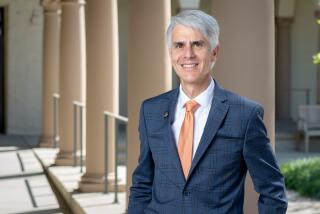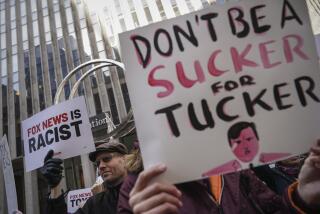Obama lifts lid on post-presidency career with civic engagement forum and has a message for young people
President Obama lifted the veil on his retirement Monday at a University of Chicago forum, engaging students with a message calling on them to use empathy and listen to those with whom they disagree.
“I have to say that there’s a reason why I’m always optimistic when things look like they’re sometimes not going the way I want. And that is because of young people like this,” Obama said in wrapping up the 80-minute forum on civic engagement.
There were no direct references to President Trump, the Republican-controlled Congress or the continued attempts to repeal and replace his signature Affordable Care Act, also known as Obamacare, or a host of executive orders the new president has used to overturn Obama policies.
Instead, the former president returned to the school where he was once a senior lecturer in constitutional law and opened the session by asking an audience filled with students, “What’s been going on since I’ve been gone?”
The forum, a discussion with six young adults, including four students, featured Obama largely delivering bromides from a historical perspective of his years as an organizer, state senator, U.S. senator and president.
“I am the first to acknowledge I did not set the world on fire, nor did I transform these communities in any significant way,” he said of his days as a community organizer on the South Side.
“But it did change me. This community gave me more than I was able to give in return. This community taught me that ordinary people, when working together, can do extraordinary things,” he said.
Of his organizing days, Obama said it was important to spend time “listening and finding out what they’re interested in and connecting their immediate needs to policies that have influence on their immediate concerns.”
“Listen to understand rather than listen to respond. That will save you a lot of heartache and grief,” said Obama, who added that it was a lesson he learned in marriage.
Obama also counseled students who have an interest in politics to be careful about their use of social media, but encouraged them to “own” any mistakes the unforgiving medium may show from their past. “If you had pictures of everything I did in high school, I probably wouldn’t be president of the United States,” he said.
It was Obama’s first public event since leaving office Jan. 20, ending a three-month vacation that included jaunts to foreign lands and launching a series of talks and paid speeches and appearances in the U.S. and internationally.
His visit also came just days before Trump marks his first 100 days in office, a symbolic deadline the new president has both ridiculed and set as a schedule for his administration’s first major accomplishments.
A Trump White House official on Monday questioned Obama’s decision to resume a public schedule so quickly, saying administration officials did not recall such a situation when Obama first took office after George W. Bush’s presidency. Obama’s office noted that other past presidents of both parties used public venues earlier than Obama.
Some Democrats had been hoping for a resurgence of Obama in the public eye as the party struggles in the aftermath of Trump’s defeat of former Secretary of State Hillary Clinton and tries to reformulate its leadership amid divisions between its Clinton establishment wing and progressives who backed Vermont Sen. Bernie Sanders’ campaign.
But other Democrats have said they must be forward-looking rather than rely on the former president to help rebuild the party. For his part, Obama made it clear that in the future he would be tackling issues he cared about — but wouldn’t be doing so on Monday.
“Although there are all kinds of issues that I care about and all kinds of issues that I intend to work on, the single most important thing I can do is to help in any way I can prepare the next generation of leadership to take up the baton and to take their own crack at changing the world,” Obama said.
“Because the one thing that I’m absolutely convinced of is that, yes, we confront a whole range of challenges from economic inequality and lack of opportunity to a criminal justice system that is too often skewed in ways that are unproductive to climate change, to issues related to violence. All those problems are serious, they’re daunting, but they’re not insolvable. What is preventing us from tackling them and making more progress really has to do with our politics and our civic life,” he said.
Obama lamented that in today’s culture, institutions where Americans often found common ground to work together on issues — such as churches, unions and rotary clubs — have declined in membership.
“People don’t have some of the same habits of being together on a common project that they used to. We’ve become a more individualistic society,” he said.
And with individuals searching the Internet for facts that back up their views, it has “people having entirely separate conversations” and “you really don’t have to confront people who have a different experience,” he said.
One of the forum participants, Harish Patel, who lost a Democratic primary for Illinois House last year, asked Obama how to deal with failure. Obama’s lone ballot defeat came in 2000, when he lost by a 2-1 ratio in a primary challenge of U.S. Rep. Bobby L. Rush.
“When I thought about that race, what I was reminded of was the degree of which it was probably the sole time in my whole career I ran because it was the next thing rather than on the theory on what I wanted to do,” Obama said. Acknowledging it may be cliche, Obama said, “Worry less about what you want to be and worry more about what you want to do.”
Rick Pearson is a reporter at the Chicago Tribune. Katherine Skiba, also a reporter there, contributed from Washington.
More to Read
Get the L.A. Times Politics newsletter
Deeply reported insights into legislation, politics and policy from Sacramento, Washington and beyond. In your inbox three times per week.
You may occasionally receive promotional content from the Los Angeles Times.






